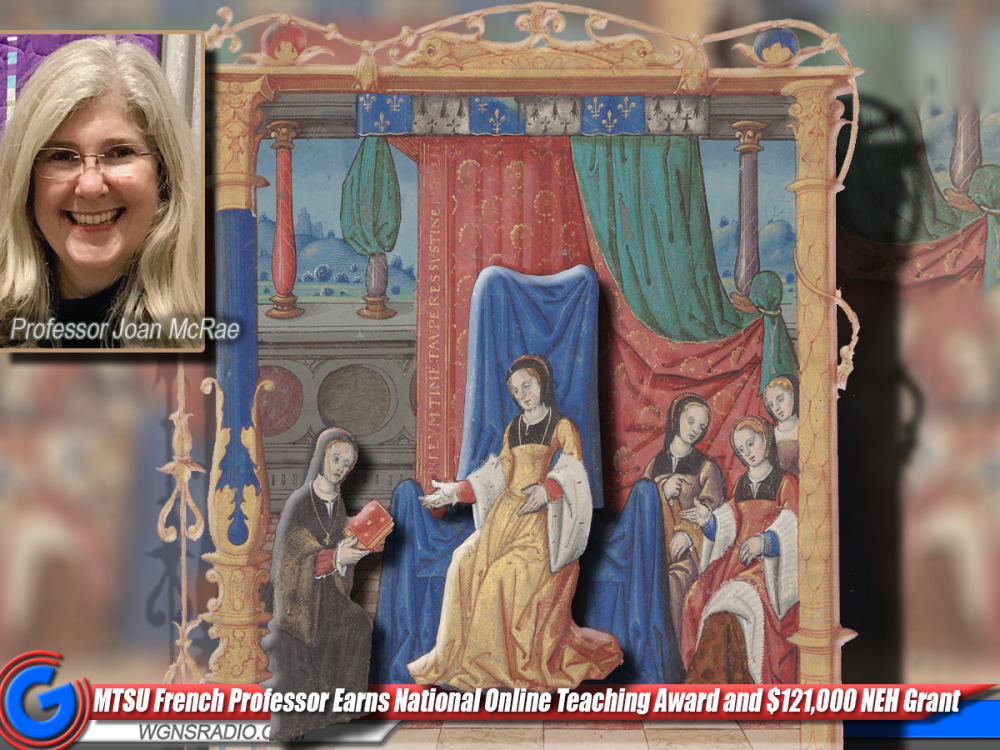MURFREESBORO, Tenn. — MTSU professor Joan McRae received two significant honors this semester: a $121,000 grant from the National Endowment for the Humanities (NEH) and the national Online Teaching Award for her innovative virtual language instruction. The NEH grant will support McRae's research on Renaissance-era feminist poet Anne de Graville, including translating her works to highlight early feminist discourse. McRae's dedication to accessible education is evident in her creation of free online French textbooks, combining traditional teaching techniques with digital tools. Starting in 2025, McRae will travel to France to study and translate 500-year-old manuscripts, contributing to the preservation and understanding of pre-1600 women's literature.
MORE DETAILS - Middle Tennessee State University World Languages, Literatures and Cultures professor Joan McRae received two nationally recognized honors this semester.
In early October, McRae landed a $121,000 grant from the National Endowment for the Humanities, or NEH. The French language professor also received the national Online Teaching Award from the Distance Learning Special Interest Group of the American Council on Teaching of Foreign Language, a professional organization that connects foreign language teachers from all educational levels.
“Receiving a major grant from the National Endowment of the Humanities constitutes well-deserved national recognition of Dr. McRae’s impactful research on early modern French literature,” said Olaf Berwald, professor and chair of the Department of World Languages, Literatures and Cultures.
Online learning success - McRae, who created three of the four online French courses, was spotlighted for her success and innovations for virtual language instruction.
“Probably the biggest thing I’ve done is write new textbooks through the library’s resource, Pressbooks, that are free for students to use,” said McRae, who has been active with MTSU’s Open Educational Resources program to provide free materials for students. “It’s engaging for students because you can incorporate all kinds of audio and visual materials, as well as quick knowledge checks and quizzes, directly into the textbook.”
The first virtual text McRae worked on was with a colleague at Virginia Commonwealth called, “L’Atelier,” for intermediate French. Currently, she is working on “Bon Voyage,” for novice learners.
With online learning, there can be challenges. But McRae said it’s a marriage of in-class techniques with computer-assisted learning that build success in online courses.
NEH research grant - The 18-month NEH grant will support McRae’s research and translation of two major works by Renaissance-era French poet and noblewoman Anne de Graville, who sought to refute the sentiment that women were inferior to men.
McRae will be working with Elizabeth L’Estrange, associate professor of art history at the University of Birmingham in England, to produce the first comprehensive, critical edition and English translation of de Graville’s works, making these key texts accessible to scholars and students.
“What is really exciting about this grant is that it is supporting research into the earliest manifestations of the feminist movement, where women were supporting their own agency and their own voices,” McRae said.
Starting in January 2025, the grant will provide McRae the opportunity to travel to France and be hands-on with de Graville’s manuscripts over the 18-month duration of the grant.
“The biggest thing this grant does is it buys me time,” McRae said.
McRae will reduce her course load so she can allot time to pore over 500-year-old manuscripts handwritten on fragile parchment and translate them. The process is tedious, as she will need to cross-reference different manuscripts to create a complete and accurate edition and translation of each text.
“In the summer, I’ll be able to go and look at the manuscripts in person at the French national libraries,” McRae said. “Some of them have beautiful illuminations and are very carefully monitored to protect them.”
Although the manuscripts are centuries old, de Graville was ahead of her time as a woman who went against the grain of society.
The manuscripts, conserved in French archives, will be transcribed, annotated, and supplemented with an apparatus detailing textual variations and literary innovations. The work will also address earlier editorial misinterpretations, restoring de Graville’s text to its original form.
To complete the project, McRae plans to create a critical bilingual edition and translation that aligns with feminist translation ethics and broaden the understanding of pre-1600 women’s writing, particularly their contributions to feminist discourse.
The project builds on recent support from the British Academy, which funded McRae and L’Estrange’s preliminary work on these texts. This groundwork demonstrated the scholarly value and cultural significance of Graville’s writings, confirming her place as an influential voice in early feminist literature.
“She is not very often referred to, but she is an important link in rediscovering the roots of feminist movement … which started in the late medieval period,” McRae explained.
To learn more about the French and Francophone Studies program at MTSU, visit https://bit.ly/41gaFwP.


